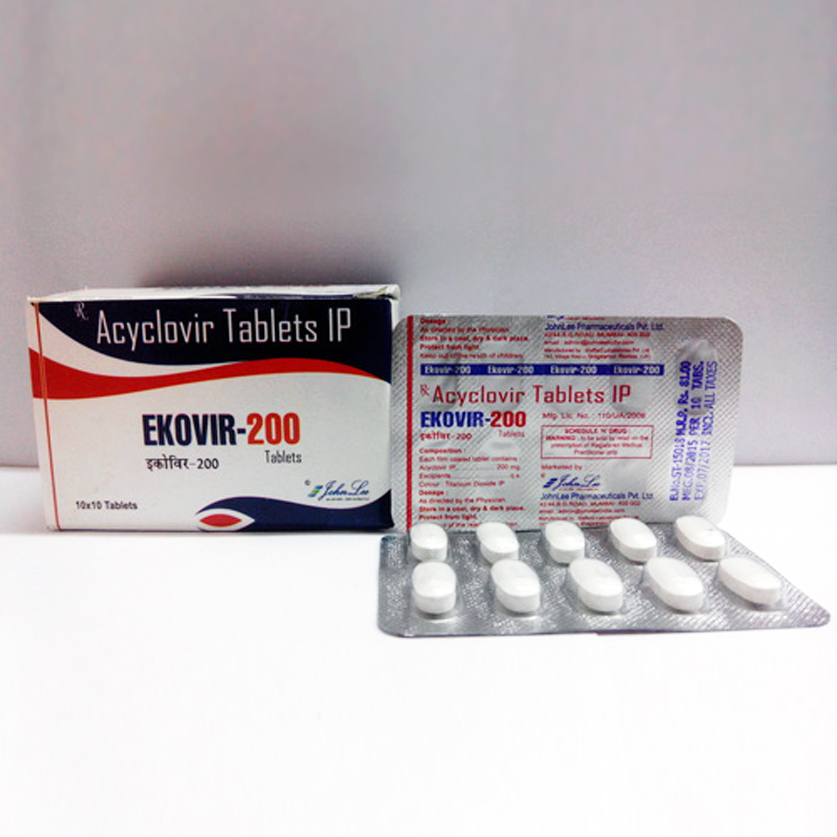description
CONTENT: Ekovir, 800mg (5 pills)
Ekovir John Lee (ACV), also known as acyclovir, is an antiviral drug. It is mainly used for the treatment of herpes simplex viral infections, chickenpox, and shingles. Other uses include preventing post-transplant cytomegalovirus infections and Epstein-Barr virus infections. It is by mouth and intravenously.
Common side effects are nausea and diarrhea. Potentially serious side effects include kidney problems and low blood platelets. Greater care is recommended for patients with poor liver or kidney function. It has generally been observed to be safe for use in pregnancy with no harm. It seems safe while breastfeeding. Aciclovir is a nucleic acid analog made from guanosine. It works by reducing the production of the viral DNA.
The discovery of acyclovir was announced in 1977. It is on the World Health Organization's list of top drugs, the most important drugs needed in a basic health system. It is available as a generic medication and is marketed under many brand names worldwide. The wholesale cost from 2014 to 2016 ranged from US $ 0.03 to US $ 0.12 for a typical oral dose. The cost of a typical treatment in the United States is less than US $ 25.
Medical use
400 mg pills from Ekovir John Lee
Acyclovir is used to treat herpes simplex virus and varicella zoster virus infections, including:
Genital herpes simplex (treatment and prevention)
Neonatal Herpes simplex
Herpes simplex labialis (Fieberbläschen)
Clapboard
Acute chickenpox in immunocompromised patients
Herpes simplex encephalitis
Acute mucocutaneous HSV infections in immunocompromised patients
Herpes of the eye and herpes simplex blepharitis (chronic (long-term) form of herpes eye infection)
Prevention of herpes viruses in immunocompromised people (such as people undergoing cancer chemotherapy)
However, oral acyclovir does not appear to reduce the risk of post-shingling pain. In those with herpes of the eye, acyclovir was found to be more effective than idoxuridine or vidarabine in relative numbers of successfully healed eyes.
Intravenöse Aciclovir ist wirksam, um schwere Erkrankungen zu behandeln, die durch verschiedene Arten von Herpes-Virus-Familie verursacht werden, enthält schwere lokalisierte Infektionen von Herpesvirus, schweren Herpes genitalis, Windpocken & Enzephalitis. Es ist auch wirksam bei systemischen oder traumatischen Herpes-Infektionen, Ekzem Herpeticum und Herpes simplex Meningitis. Rezensionen der Forschung aus den 1980er Jahren zeigen, gibt es eine gewisse Wirkung bei der Verringerung der Anzahl und Dauer der Läsionen, wenn Aciclovir in einem frühen Stadium eines Ausbruchs angewendet wird. Jüngste Untersuchungen zeigen die Wirksamkeit des topischen Aciclovir sowohl in der frühen als auch in der späten Phase des Ausbruchs sowie die Verbesserung der methodisch und in Bezug auf die statistische Sicherheit aus früheren Studien. Aciclovir-Studien zeigen, dass dieser Agent keine Rolle bei der Verhinderung der HIV-Übertragung hat, Aber es kann helfen, langsam HIV-Krankheit Fortschritte bei Menschen nicht Anti-retrovirale Therapie (ART). Diese Feststellung unterstreicht die Bedeutung der Prüfung einfacher, kostengünstiger Nicht-ART-Strategien wie Aciclovir und Cotrimoxazol bei Menschen mit HIV.
pregnancy
as a category B drug, the CDC and others have stated that acyclovir can be used for severe recurrent or first-time episodes of genital herpes. [For severe HSV infections (especially disseminated HSV), IV acyclovir can also be used. Studies in mice, rabbits and rats (at doses more than ten times the equivalent used in mankind) given during organogenesis have not detected any birth defects. Studies in rats in which they received the equivalent of 63 times the standard steady-state human concentrations of the drug on day 10 of pregnancy showed head and tail abnormalities.
Acyclovir is recommended by the CDC for the treatment of varicella during pregnancy, especially during the second and third trimesters
Acyclovir is excreted in breast milk, so it is recommended that caution should be used in breastfeeding women. It has been shown in limited studies that the foster child is exposed to approximately 0.3 mg / kg / day after oral administration of acyclovir to the mother. If nursing mothers have herpetic lesions near or on the breast, breast-feeding should be avoided.
Side effects
Systemic therapy
Gemeinsame Nebenwirkungen (& lgr; 1% der Patienten), die mit einer systemischen Aciclovir-Therapie (oral oder IV) assoziiert sind, schließen ein: Übelkeit, Erbrechen, Durchfall, Enzephalopathie (nur mit IV-Gebrauch), Injektionsstellenreaktionen (nur mit IV-Gebrauch) Und Kopfschmerzen In hohen Dosen wurden Halluzinationen berichtet. Unregelmäßige Nebenwirkungen (0,1-1% der Patienten) sind: Agitation, Schwindel, Verwirrung, Schwindel, Ödeme, Arthralgie, Halsschmerzen, Verstopfung, Bauchschmerzen, Haarausfall, Hautausschlag und Schwäche. Seltene Nebenwirkungen (< 0,1% der Patienten) sind: Koma, Krampfanfälle, Neutropenie, Leukopenie, Kristallurie, Anorexie, Müdigkeit, Hepatitis, Stevens-Johnson-Syndrom, toxische epidermale Nekrolyse, thrombotische thrombozytopenische Purpura und Anaphylaxie. Intravenöses Aciclovir kann reversible Nephrotoxizität bei bis zu 5% bis 10% der Patienten aufgrund der Ausfällung von Aciclovir-Kristallen in der Niere verursachen. Aciclovir kristalline Nephropathie ist häufiger, wenn Aciclovir als schnelle Infusion gegeben wird und bei Patienten mit Dehydratation und bereits vorhandenen Nierenfunktionsstörungen. Eine ausreichende Hydratation, eine langsamere Infusionsrate und eine auf Nierenfunktion basierende Dosierung können dieses Risiko reduzieren.





